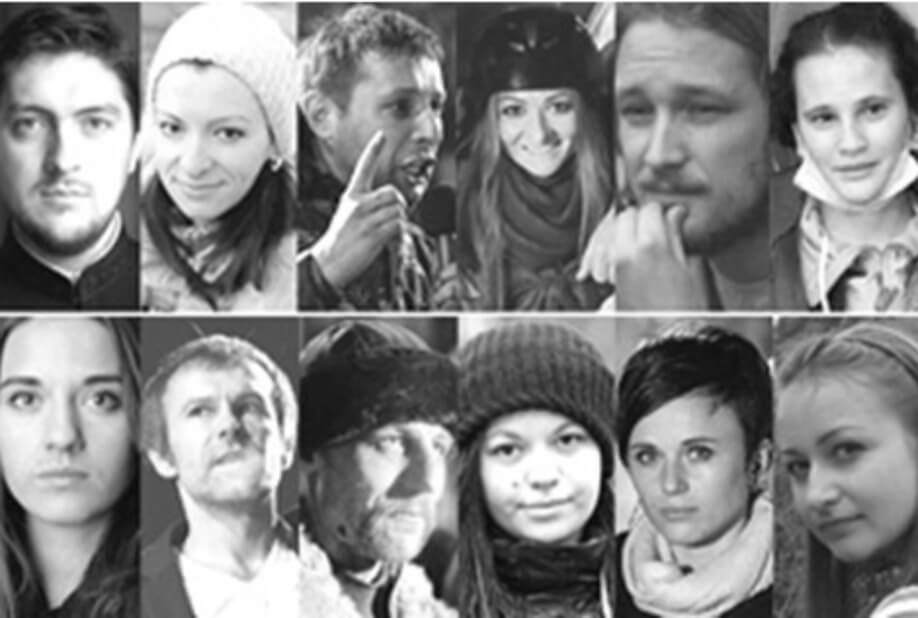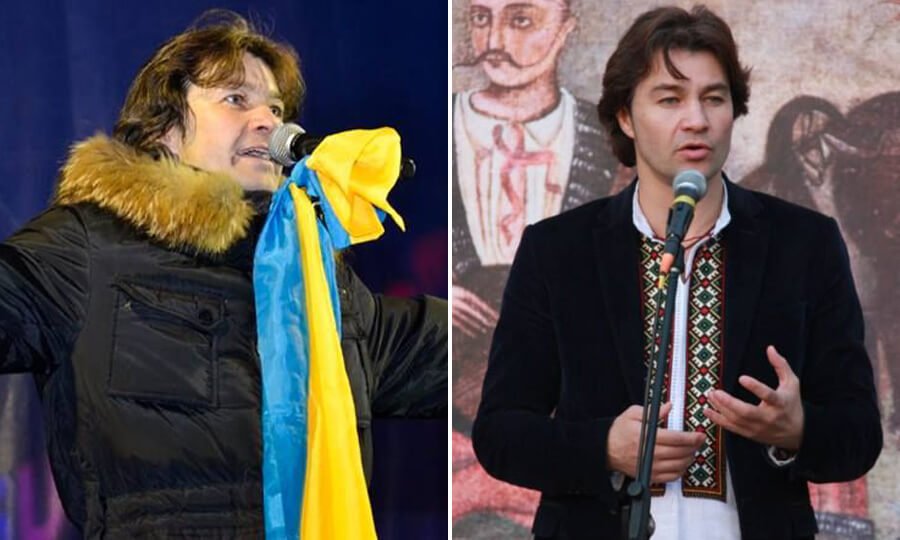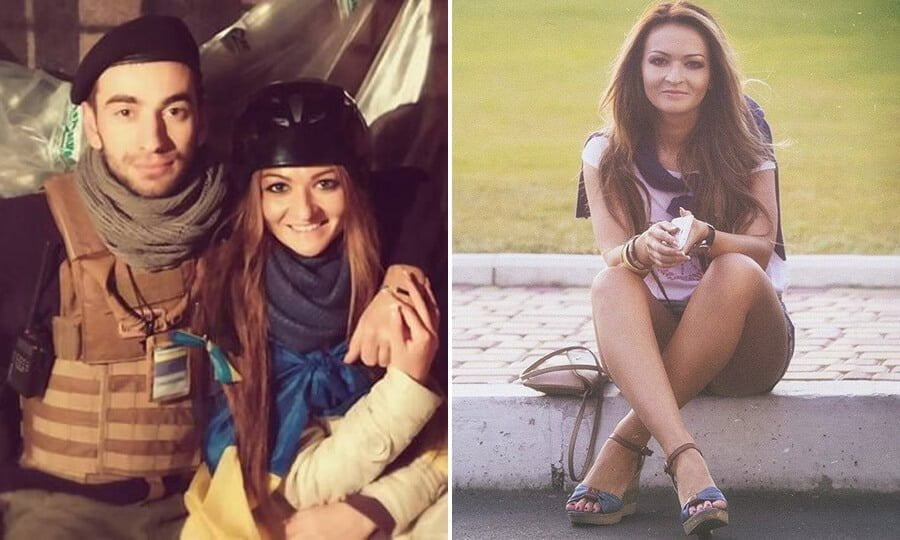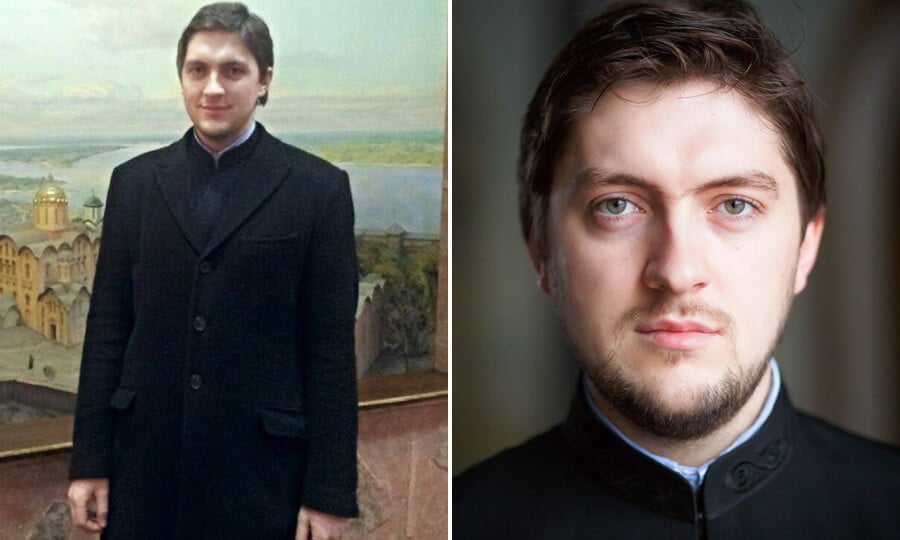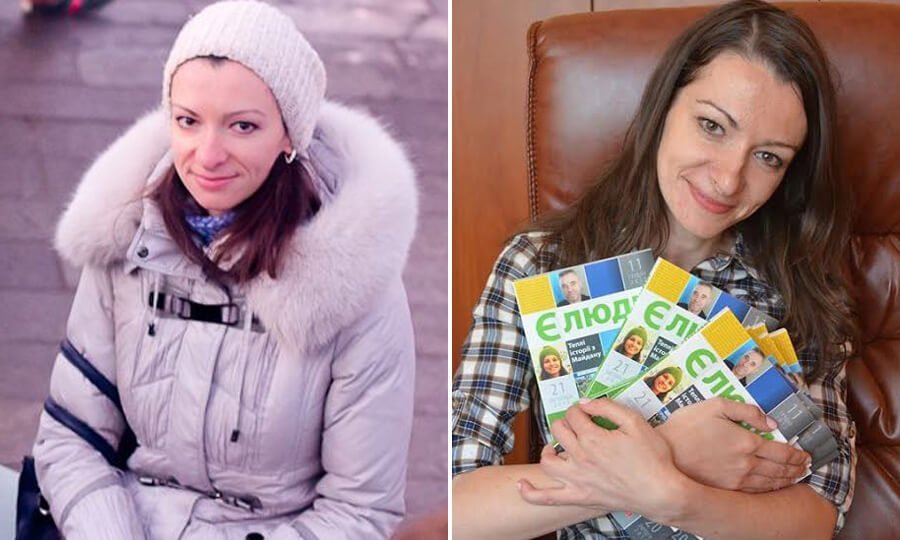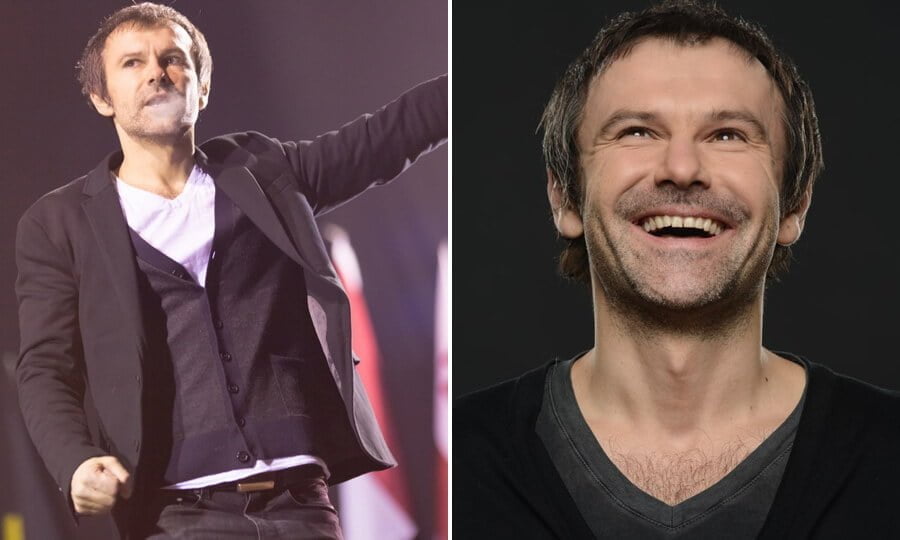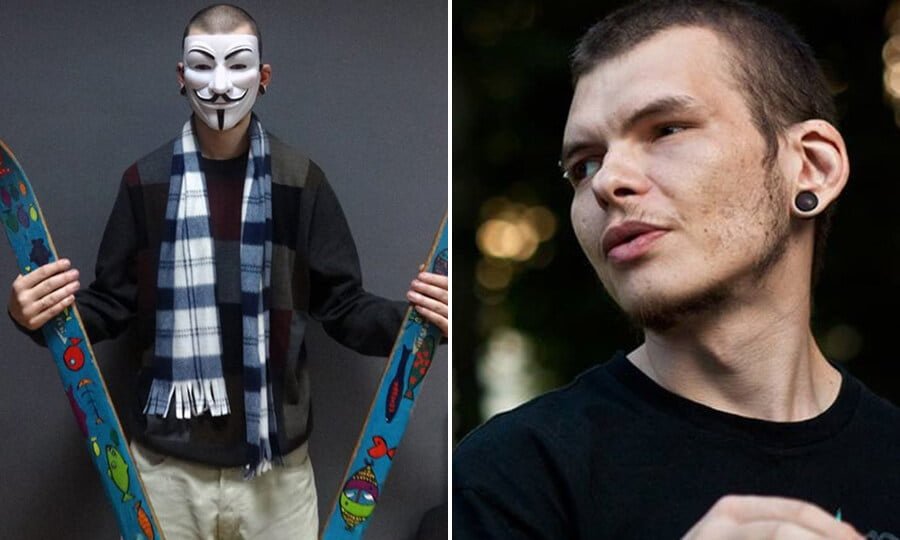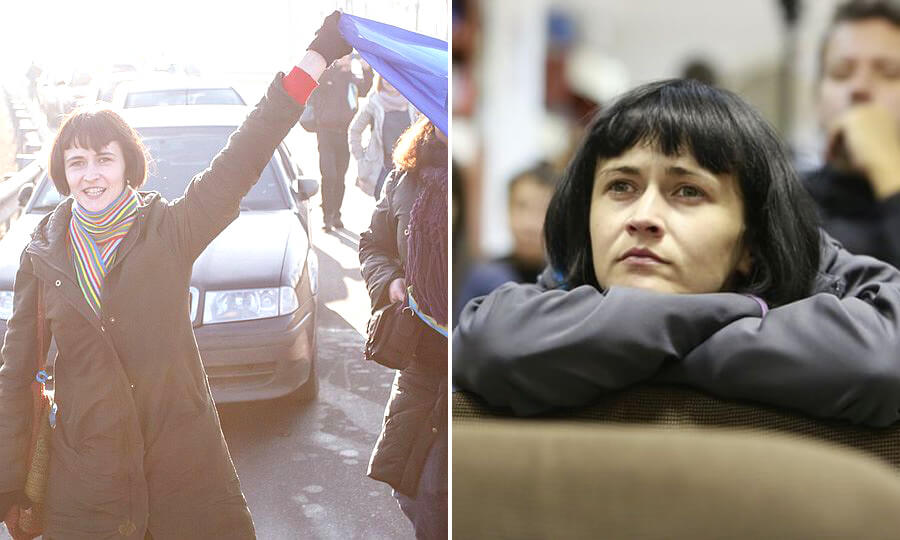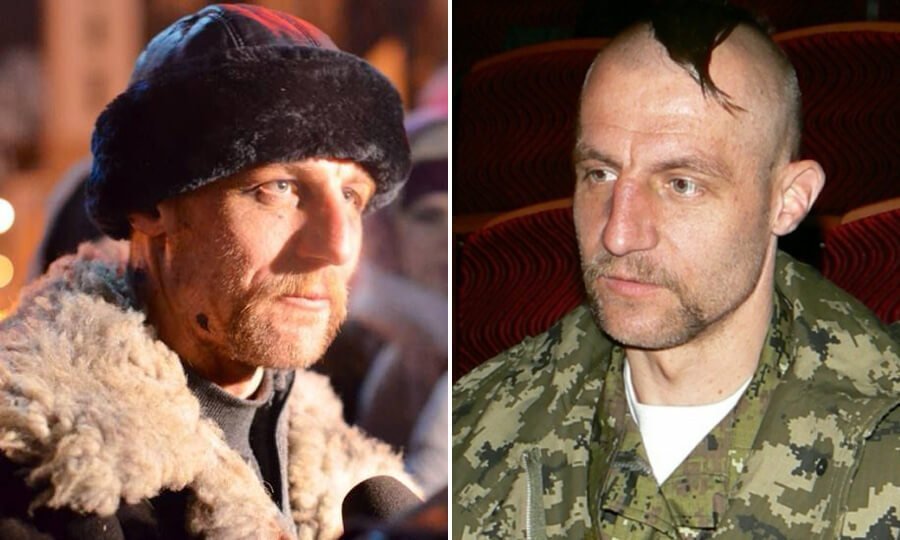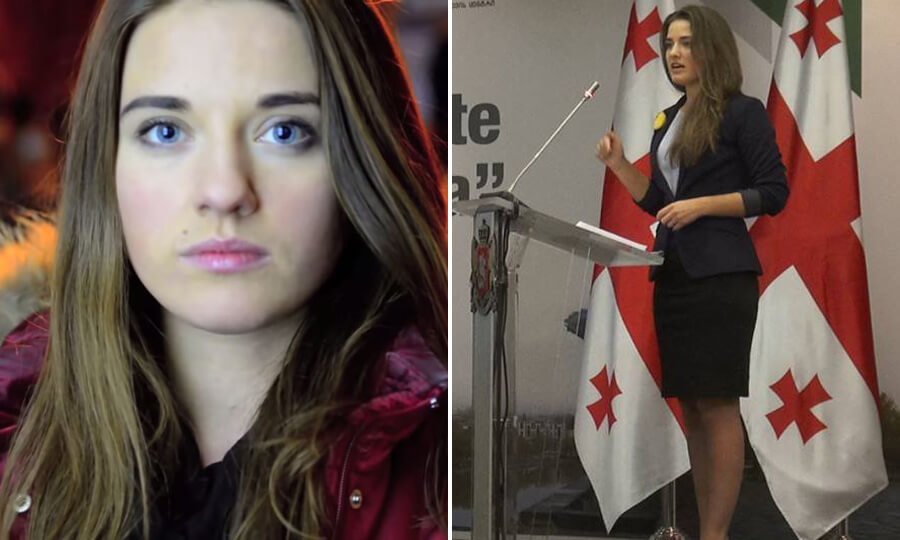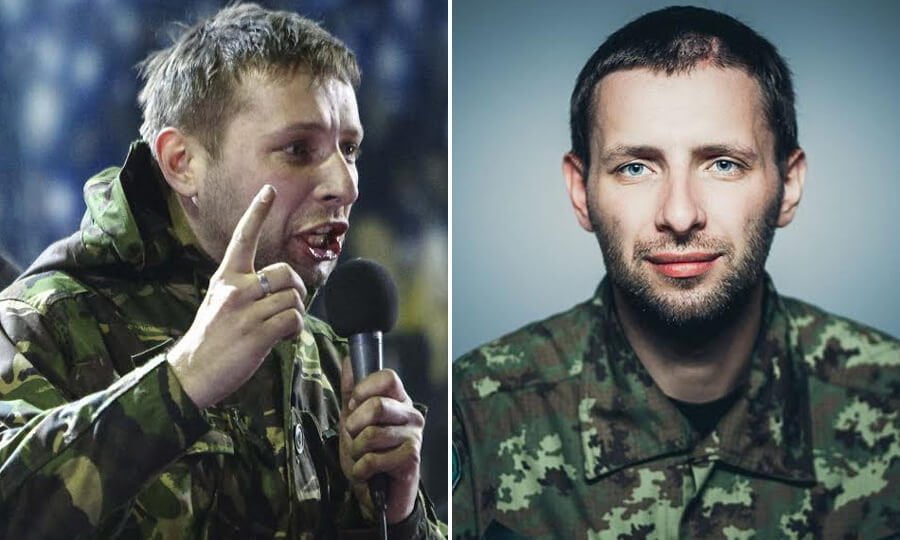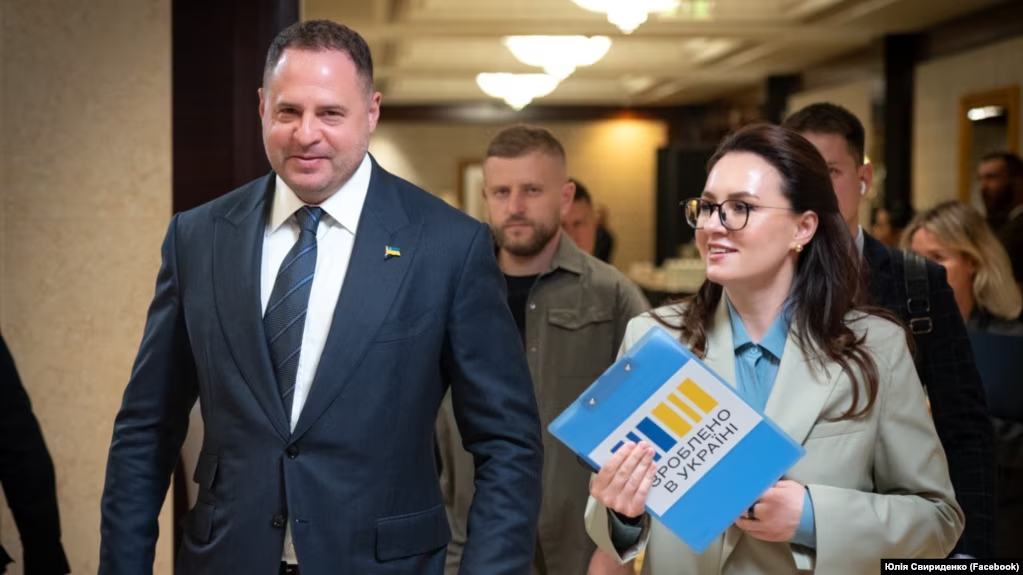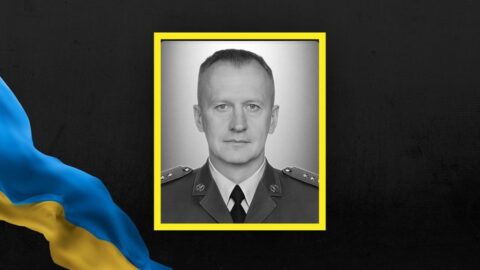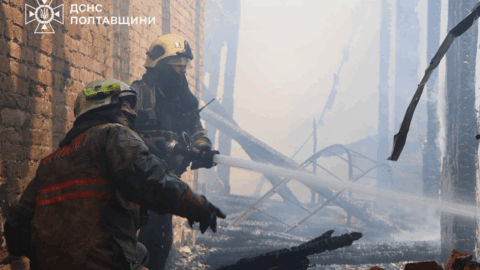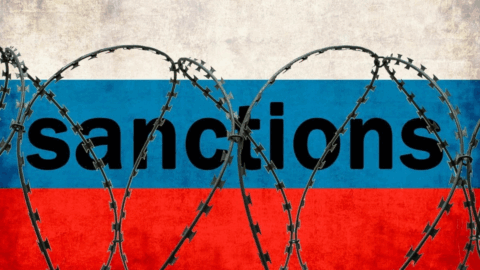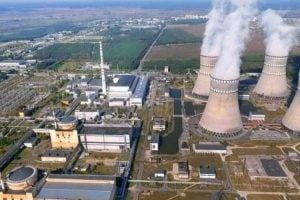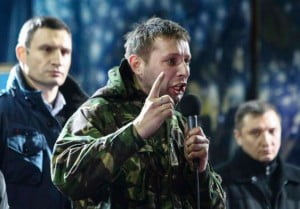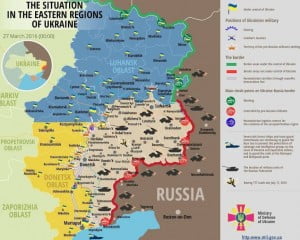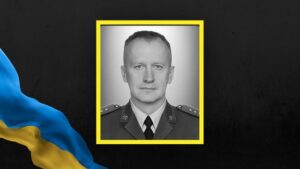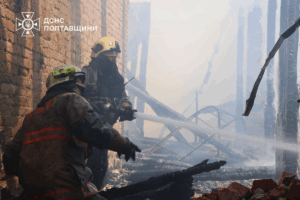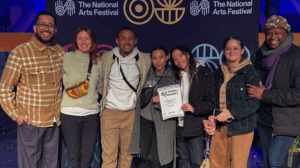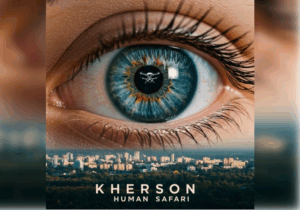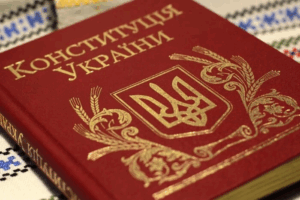“Ukraynska Pravda” [an internet publication] has invited some of the activists and volunteers who participated in what has come to be known as the Maidan to reminisce about what they consider to be the most significant events in the ninety-four days of protests and to share with us how the events have changed them. We will go along as we listen and reminisce while reminding ourselves of the chronology of what happened.
“Dress warm. Bring an umbrella. And tea and coffee and your good vibes and your friends. Meet at the Independence Monument at 22:30.” This is what journalist Mustafa Nayyem posted on his Facebook page on November 21, 2013. This is what started the Maidan.
As Inna Nerodyk walked toward the monument on Independence Square she couldn’t imagine that the innocent call sent out to friends to join a protest would bring such unpredictable and violent and deadly events: a vicious attack on the students, clashes on Bankova Street (location of government offices), police raids on the square, the deaths of activists on Hrushevskyi Street, persecution, torture, a day of mass killing and the flight of Viktor Yanukovich. And month after month of civic unrest.
INNA NERODYK, age 26.
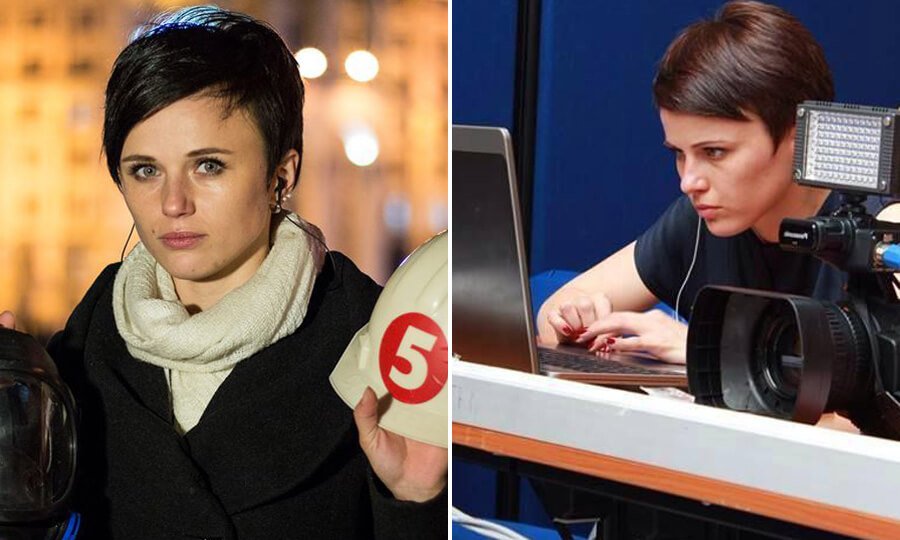
Journalist for 5 KANAL then and now.
“Here I am ready to join a revolution and no one is here,” she tweeted on that evening in late November. She and her friend were the first to come to Independence Square. Some fifteen minutes later other journalists began trickling in.
There are times when Facebook explodes in a storm of frustrated voices. That night was like that.
Inna said: my friend and I were sure the universal feeling of deep discontent would bring people out to the square. We didn’t expect to find an empty square. That was, after all, why we were there, to watch the “concerned citizens” coming out. And all we saw was construction equipment. It had been set up to lift the Christmas tree into an upright position.
The social networks did their job. People came. Alone, in pairs, and in groups. Still when there weren’t too many of us, a policeman came up to us and asked, “What’s going on here?” “We’re just out for a stroll taking pictures,” we said and we did take pictures. To have as a keepsake. We didn’t know, then, what a precious keepsake it would be.
I can’t single out one most vivid picture in my memory. A man in a wheelchair smashing cobblestones to pieces with a crowbar. Young girls loading the smashed cobblestones into sacks and dragging them to the barricades. Teachers who came to the barricades straight from school in their skirts and pantyhose, in their high heels that kept getting stuck in the sand and mud as they dug out the cobblestones. Women rolling tires to the barricades. Old grannies in torn coats putting 500 UAH in collection boxes. Men cooking.
I think we have all been changed by the Maidan. Even by the aftermath of the Maidan. When did the first hundreds of thousands come to the Maidan? To cry at the funerals after the 20th of February. Bringing tons of flowers. They,too, were changed by the Maidan.
No matter what the current situation will bring us, what is happening now cannot be considered a consequence of the Revolution of Dignity. This is something else. This is separate. The revolution was powerful and full of light. And the light wasn’t emanating just from the burning tires.
OLENKA PODOBIED-FRANKIVSKA, age 29
From the very beginning Olenka served as housing coordinator for the people arriving on the Maidan. After the students were violently disbanded and the first shots were fired she set up a first aid station next to St. Michael’s Cathedral. Today she is coordinator of “The Euromaidan Civic Center,” a national network.
“I got to the Maidan around the twenty-sixth or twenty-seventh of November. I wondered where I should go to be of some use. I signed up to help find housing and shelter for the new arrivals. I was told to go see Olenka. Her name was like a password: everyone knew her and she knew everything. You don’t understand something? Olenka will explain. A difficult situation? Olenka will help solve it. You need something? Go see Olenka,” a Maidan participant reminisces.
I remember how quickly the space under the pillar became crowded. First it was with sacks of food and thermoses and then with the bundles people brought from home.
People kept coming and coming. At first I didn’t believe that this was the start of a revolution. I felt a sense of creeping panic, though: where will they all sleep?
What I remember most is those nights the metro shut down and there weren’t enough local people willing to bring protesters to their homes for the night. When the last coffee shop on Independence Square closed for the night we went to the one nearby that stayed open 24 hours. Police agents tailed us everywhere, and soon those of us who worked to find the protesters a shelter for the night recognized their faces. We were tailed by three shifts of policemen.
And then the night of the raid was upon us, followed with a morning at St. Michael’s Cathedral. We’d left everything behind. All of it, from office supplies to the faith we had that things would be alright, that our peaceful public assembly would pass without violence.
Then it was the Maidan again, this time with little wood huts that we arranged into service booths for the volunteers providing housing information and as little warehouses supplying warm clothing and a booth that was a kitchen. And then St. Nicholas Day came, and New Year’s… and then all the killing. And once again, St. Michael’s.
What I remember most is myself walking around St. Michael’s monastery checking whether the people sitting down or lying on the floor had mats and I noticed a man completely covered with a white – was it a blanket or a sheet, and I’m thinking to myself, he must be uncomfortable, lying there like that, I should move him over a bit. I walked up to him and realized that he was dead.
And I remember the carefully laid corpses on the soft grass right by the door to the monastery. And the doctors, so brave and calm and composed.
The Maidan has confirmed my conviction that every good deed will sooner or later break the wall of evil. It has shown me people to admire without my knowing who they were. The Maidan has renewed my faith in my country. I now know that even if we don’t succeed in changing everything now, right away, this time, there will still be an incredibly large number of stubborn dreamers ready to breathe new life into the country. Like phoenixes rising from the ashes again and again.
Yehor Petrov, age 27
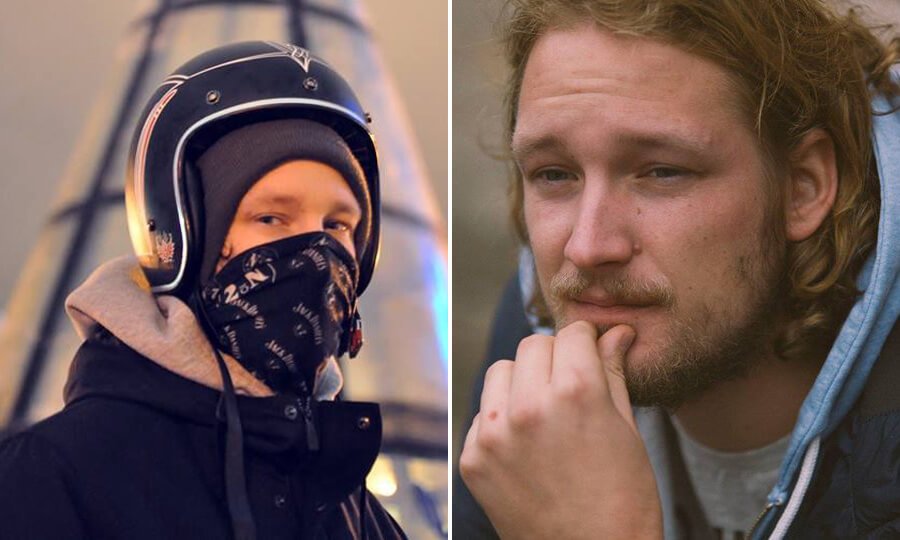
During the Maidan Yehor designed posters, among them the poster “Drops in the Ocean.” Currently he is co-owner of the advertising agency BANDA. He is active in non-commercial projects and helped create the advertisement “Each of Us.”
The strongest impression I have of the Maidan is the day after the students were viciously beaten.
On November 30 I met a lot of my friends at St. Michael’s Cathedral. We discussed the news we’d heard and thought about what we could do. The feeling of absolute helplessness was strong.
I decided to do what I do best. I went home and sketched “Drop.” I designed other posters after that.
It was terrifying at times. My friends and I just made posters and that was basically it. We got anonymous calls on our phones – just dead air. I remember how frightening things were in February.
I remember the day December 11th. I was on the Maidan until noon and then I went home. We turned on the news and saw the beginning of the raid. I saw how many “Berkut” troops were there and I got scared. For a while I wondered what I should do. I got dressed and went over to the Maidan. I saw so many men coming out of the surrounding buildings and so many arriving in taxis. There were thousands in a few hours.
Whenever I felt bad about the way things were I would go to the Maidan. I would shovel snow or I would bring something. I wanted to do something. The main thing was just to be there. Being there brought a sense of calm.
The Maidan has affected how I feel about a lot of things. For instance, as a kid, you had your room. You were constantly reminded to clean it. But that was such a drag, you would rather go outside to play or watch TV. And then after you moved out and had your own apartment for the first time suddenly you had something that was yours and you wanted to take care of it the best you could. And it was a completely new and different feeling.
This is what has happened in our country. I do things now that I would never have thought of doing before.
Take for example the project we took on for the Ministry of Defense, promoting the armed forces. It was a project Mark Raymond Wilkins and I did for free. We spent a lot of time and money on it.
But that’s not the important thing. What is important is that before the Maidan I would never have thought that I could do something together with the government.
EVHEN NYSHCHUK, age 41
Evhen was the “voice of the Maidan.” Until December 2014 he was Minister of Culture.
An actor, Evhen Nyshchuk participated in the Maidan from the first days. He was there during the most intense standoffs. He was there on February 19th.
I remember being in a bulletproof van near Shevchenko Park and when I got out of this van I saw a huge column of humanity and I remember the sensation I felt seeing such a mass of humanity. I couldn’t see an inch of bare pavement, just heads and heads and heads going forward.
And I remember the 11th of December when I went into the union building from where I heard the racket of a raid being carried out and in the midst of that din a voice calling all of Kyiv to come and they came and kept coming ready to help until morning. That was the first time the Berkut police were forced to retreat.
There were moments of joy, too, like New Years’s Eve. Artists who had never had a chance to perform at major venues for big holidays came together on the Maidan.
I remember the raid on the 18th of February. I had been warned that there would be a raid. All the expensive equipment was removed from the Maidan and people said the stage would be set on fire. I stayed, though. I couldn’t not stay.
I don’t know where the idea came from to burn holiday decorations just to keep the fire going, or to guide people which way to go to prevent bottlenecks. Those memories will be with me for the rest of my life.
I remember Zhyznevskyi’s funeral. We were all in a state of stupor. I didn’t know what to say to his family or to the young men who carried the coffin. That was when the song-lament “Plyve kacha” was played for the first time. It became a hymn for other funerals. Zhyznevskyi loved that tune.
We are in a war. The war is eating up so much human energy and so many resources. The full resurgence of our country has been slowed down. At the same time we are able for the first time to do the things we had never dared to try before.
As for me, I now have the courage to deny licensing for the distribution of those Russian films that distort history, and to create a commission banning any Russian series and shows that feature stars who use television to speak against Ukrainian values, against the Ukrainian nation, its history and culture.
LIDA PANKIV, age 25
Lida was and is a telejournalist for STB Channel.
These days I hardly ever walk through the square that was the Maidan. A year has passed and it is still painful. It seems like yesterday that our feet froze and our fingers went numb and our eyes burned from the teargas and teared up from the deaths…possibly the Maidan is still ongoing… not in the center of the city though but in the center of our beings.
I expect my children won’t have to live in tents to stop some scum and his rude degenerate offspring from stealing what is rightfully theirs. I expect they will not have to burn tires to protect their homes.
Of course I expect they won’t have to hurl Molotov cocktails into those who are supposed to be protecting them, but… I will pass the instructions and recipes on how to make a Molotov cocktail to my children, just in case.
And I will tell them how one small person can change the whole world. If they won’t believe me I will tell them about the Maidan and show them the pictures and the videos.
MARKIAN MATSEKH, age 23
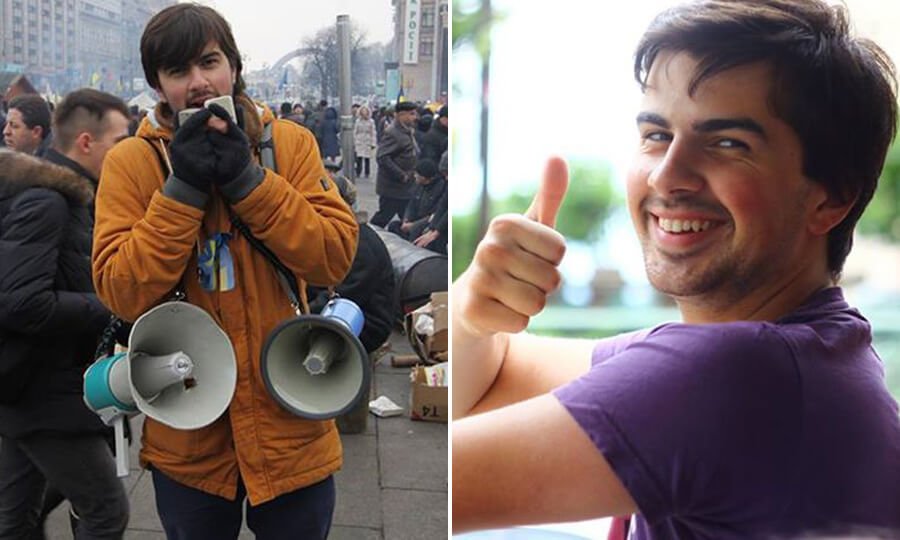
During the Maidan Markian came up with the idea to set up a piano right in front of the rows of riot police. The photo of Markian playing the blue and yellow piano in front of the police has been seen around the world. The piano became a symbol of the Ukrainian revolution. Today Markian works for the IT company ELEKS.
Markian said: that piano served as a message to the militia – it showed them who was at the Maidan and what kind of people they were. I don’t know if my act produced any kind of concrete result but about a week after that an incident occurred that proved that there were men on the other side of the barricade who could be addressed.
A friend of mine who owns the hostel I stayed in was walking down the street. She saw a bus full of militia parked in the street. One of the men motioned to her to come up to the window. She did. He showed her his cell phone. On the small screen he had texted, “We are with the people.”
I remember the 11th of December very well. That evening I was supposed to bring paint and a megaphone to the Maidan. When I got there I saw that it was surrounded. Preparations for a raid were underway. People panicked – they were being surrounded from all sides with no escape. They were being pushed all together to one side. I went here and there, not knowing what to do. My Dad called and yelled at me to get out of there. When Dad arrived I talked him into staying. He said, “Alright. I guess if we have to die we might as well die together.”
Now I can see that all of us have great potential if we set a goal for ourselves. It took 3-4 days to execute my idea with the piano but the action had consequences.
After the Maidan I felt like I was a part of Ukraine. Patriotism became personal. I tear up when I see the Ukrainian flag.
IVAN SYDOR, age 25
Priest of the Ukrainian Orthodox Church, Kyiv Patriarchate. Bell ringer at St. Michael’s Cathedral.
On the night of December 11th Kyiv was awakened by the tolling of the bells at St. Michael’s Cathedral. Not only were the bells ringing for peace and security throughout Ukraine after a night of an attempted raid on the Maidan, the bells rang to announce the end of the Yanukovych regime. And it was Ivan Sydor who rang the bells. Nowadays Ivan is busy collecting aid for the soldiers in the east and believes that people now have more faith in God and have begun to put more trust in the church.
I remember that night very vividly. I received an anonymous phone call. The voice asked me to ring the bells. Then my phone rang again. And again and again… by morning I had received over a hundred calls I was unable to respond to promptly. All night students from the Theology Academy and I were busy ringing the bells. It was probably the first time in eight centuries that the bells tolled.
At first we just wanted to fill up the square with people. It was a freezing night, and not too many people were there. It was only by next morning that I understood that besides calling people to come to the Maidan the sound of bells cleansed their spirits, too. I understood it even better after the people who stood on the Maidan called me and wrote to me. They described how the sound of the bells pushed away fear and ushered in a feeling of confidence. A confidence in their own strength – an awareness that they would be able to withstand everything.
I am not excluding the possibility that the sound of the bells had entered the hearts of the Berkut forces, too. They’re live humans, after all.
After the Maidan many folks found faith in God, even atheists wrote me letters thanking me because the church had brought them back to the Lord. Lots of former members who belonged to the church under the Moscow Patriarchate switched over to the Kyiv Patriarchate. Muslims praised us, too.
I’m twenty-five years old. Rather young. Who could have thought that it would be here on the Maidan that I would see a bloodied head for the first time, the first tears of pain, tears brought on by terror and the loss of life?
KHRYSTYNA BERDYNSKYKH, age 31
During the Maidan Khrystyna authored the project “ThereArePeople.” Today she is a correspondent for the publication “Novoe Vremia.”
At the beginning of December Khrystyna resigned from the publication “Korrespondent” in protest of censorship and created the group “IEliudy” [“ThereArePeople”].
I remember the night of the raid on the 10th of December very well. On that day I did go to the Maidan but I went home in the evening because I had an article to write for a foreign publication about the oligarchs who are Yanukovych’s associates.
I didn’t write the article that night. Around midnight when the assault on the Maidan was set in motion I just couldn’t settle down. I wanted to help somehow, so I decided to look for a ride on the internet. People wrote and asked for help and I was impressed with their openness and the responsiveness of the others. When I made it to the Maidan on the first morning train I saw huge crowds of people there.
As I worked on the project I met a lot of volunteers and activists but the story of 22-year-old Oksana from Lviv shook me up the most. The young woman took it upon herself to arrange the funerals for the Heaven’s Hundred: she bought the coffins, the wreaths, shoes and clothing for the deceased. She was so young, yet she listened to the relatives telling her off, blaming her for the deaths and declining assistance. “We don’t need anything. The Maidan has taken our children.” Such a young woman, so delicate, yet so strong.
The Maidan has shown me that nothing is impossible. It has shown me that everything depends on people. I never thought I would be able to publish the stories of ordinary people taking part in a revolution.
SVIATOSLAV VAKARCHUK, age 39
Leader of the group “Okean Elzy.”
After the attempt by the authorities to raid the Maidan on the night of December 10th Sviatoslav Vakarchuk arranged a concert in support of the Maidan. “Important things unite,” he tweeted.
I’ll go through several incidents that have been carved in my memory. They’re in chronological order.
I was very impressed with the unbelievable number of people that showed up on the Maidan on the first of December, 2013, following the night raid and after the beatings on November 30th of the students who had gathered for a peaceful rally at the foot of the stele.
Early in the morning I went to the center of Kyiv. It was a miracle that there I was in the center of this massive gathering of people, hundreds of thousands, perhaps a million individuals. A rough platform on a truck served as a soapbox where I, too was able to give an impromptu speech. I will remember that for the rest of my life.
By the way, there was something else that had happened earlier. When I spoke to the students on the Maidan in November I ended my speech with the words, “This is just the beginning.” Truthfully, I was referring to both the good and the bad. I still say those words, because for me they aren’t some kind of bad premonition, but a guide to action for all of us. We need to take action and change the country instead of waiting for someone to come in and do it for us.
I have incredibly vivid and moving memories of the night of December 10th – 11th, 2013. I was getting ready for bed and like everybody else I was checking the news. “Ukrainian Truth” ran a news flash in large letters: THE MAIDAN IS BEING STORMED.
I turned on Channel 5 and saw what was happening. I dressed and went to the Maidan. I remember the stream of people flowing from all over the city into the center, and how many of my friends I came across. I stumbled upon Pasha Hudimov, too, with whom we had the idea to arrange a concert exactly as we did several days later, on December 14th.
I remember another day very vividly, January 22, 2014, the day Serhiy Nihoian was killed. I wept when I read about his murder. I almost never cry but the tears just came: a young, educated man, who wasn’t even Ukrainian had died. I was struck with a flash of comprehension: Ukrainians are those who share the same system of values: it is a bond of beliefs, not of blood.
And the final memory is of that horrible tragic day the 20th of February, 2014. I was able to get into the parliament building (miraculously because I had no papers) and I talked those deputies I knew into entering a resolution and voting on it: “we condemn the use of violence which has led to the deaths of civilians.” It worked. Maybe the statement didn’t have significant legal consequences but it had great political consequences.
I myself did not go through any radical change. I was involved in charity work before the Maidan, and I am still involved in charity work. I met and communicated with people before, and I meet and communicate with people now. The only difference is that now it is all much more intense.
But what has really changed is my opinion of our civic society. We have become more active and more involved. But we still have a long way to go.
ILLIA STRONHOVSKYI, age 31
During the Maidan Illia designed several political posters and signs, among them the poster “Evergreen Tree” and the sign “WE ARE CHANGING OUR COUNTRY, PLEASE EXCUSE THE INCONVENIENCE,” the series “The Cultural Aspect of the Maidan,” “Agents from Outer Space” and others.
Now together with Lilia Omelianenko he has launched a charity fund called “Dobra lystivka” [“Good Postcard”] (dobralystivka.com) which subsidizes rehabilitative programs in Ukraine.
When I happened upon the Maidan for the first time in the beginning of December coming out of a little side street into the crowd I was shocked. The mass of humanity was like a living organism, like Stanislav Lem’s ocean. None of the photographs or television shots were able to show even remotely what it was really like.
One night, looking for a way to help out, a friend of mine and I decided to shovel snow on the Maidan. We had no problem finding shovels, but finding a spot that needed to be shoveled was a lot more difficult. In the end we found ourselves shoveling Instytutska Street.
What left a strong impression was watching the birth of anarchitecture [anarchism in architecture]. How people hung flags and slogans on the bare trunk of the evergreen tree. All the little boards with place names on them, all the painted helmets…
It is natural for Ukrainians to decorate everything: living in a house you decorate your house and when you are living on the Maidan, you decorate the tents, the helmets. All that art is effortless, spontaneous, and wonderful.
The charity “Good Postcard” grew out of the Maidan. Neither Lilia nor I had ever been involved in any charity work before. I had collected funds for “Mission in Ukraine” but the sum collected was modest, maybe one or two thousand UAH. I promoted the drive for pampers for children with special needs. I had never imagined that something like that could be done on a massive scale.
Today the postcards are sold in ten stores in Ukraine and in stores across four countries. Without the Maidan this scale of aid and the desire to help would not have happened.
The Maidan taught me to have trust in people. It’s not that I didn’t have trust in people before; it’s just that now I have trust in so many more people than I ever had before.
LIZA SHAPOSHNIK, age 27
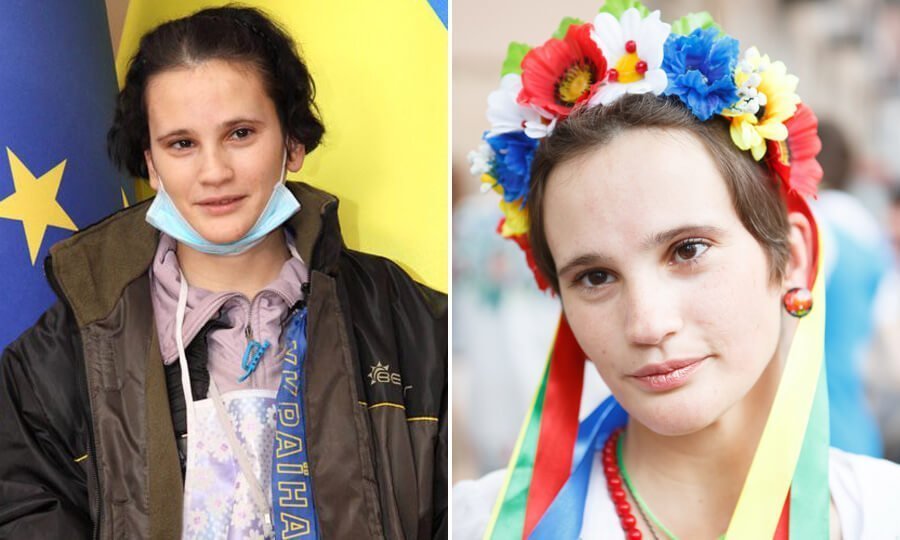
During the Maidan Liza was a volunteer kitchen helper. Now she is helping the soldiers in the town of Shchastia.
Handicapped since childhood with a mild form of cerebral palsy Liza hadn’t worked anywhere before the Maidan. She got married to another volunteer in May. For their wedding the couple was dressed in camouflage pants and embroidered shirts. Instead of the customary veil Liza had a wreath on her head.
I remember the toppling of Yanukovych most vividly. Other than that I remember when everything was all over and that moment when we had won our place at foot of the stele. The pain that had accumulated in each of us, that all of us had carried inside could no longer be contained. The fact that we were all united helped us win. We were all different people with different destinies and a different social status. But we all stood united and fought together. Unity is essential.
The Maidan has taught me to suffer, to be patient, and to struggle. I think others have learned the same lessons. Included should be the call to open our eyes. It is important to observe and to comprehend. Seeing all that has happened on the Maidan, seeing the spilling of human blood I cannot be indifferent. I have never been indifferent but I never believed that things could be changed. Now sitting by and doing nothing is not an option. I am here with our men in arms. I help in any way I can.
VASYLYNA DUMAN, age 27
Vasylyna came up with the idea of the “Euromaidan is…” wrappers. She directed the art department at the civic center on the Maidan. Today she works as a journalist and is writing a book about the war in Donbas. Vasylyna helps with the “Military portal.”
I remember the night of November 30th, the night the students were violently dispersed. I was trying to find someplace to volunteer and ended up in the housing sector. The protest was being smothered. Lots of people had left. So the housing sector was inactive.
My new friend, Katia Overchenko and I sadly walked through the Maidan thinking that nothing was accomplished and it’s all ending with no results. Suddenly Katia said, no way, this is not how it’s going to end. Look at all those people standing around the monument, and they have nowhere to go. Are we just going to let them spend the night there like that? I have people who are willing and ready to take folks in for the night. I’m going ahead!
We found Kolia Vyhovsky in the square. He, too, was involved in finding housing for the protesters. Kolia was all wrapped in a warm blanket and wasn’t too friendly. Several hours later they were both victims of the Berkut raid. Thank God it wasn’t too bad.
I felt doomed after the first death on the Maidan.
One day I was standing in the street talking with a friend. We were surrounded with booming sounds, flying rubber bullets, and burning tires. An old man shuffled past. He looked like a homeless man. He limped by with a cane. The smoke from the burning tires drifted in our direction. The old man addressed the smoke, “Where do you think you’re going? We don’t need you here. Go that way!”I couldn’t believe my eyes: the curtain of smoke made a turn and drifted in the direction of the police.
I realized that it’s not food and money people need most, it’s an opportunity to be needed. When an opportunity presents itself even the worst derelicts can become heroes.
I remember a guy who sold his blood to have money for vodka. During the Maidan he risked his life to bring firewood. People in general felt a sense of mission on the Maidan and rising to the occasion they did extraordinary, heroic things.
MYKHAILO HAVRYLIUK, age 35
Mykhailo was a member of a civic self-defense squad on the Maidan. Today he is a MP in the Parliament.
He came to the Maidan after he heard about the violent raid on the students on the 30th of November. On January 22nd 2014 the special forces assaulted Mykhailo Havryliuk. They undressed him in the freezing cold and tortured him. They videotaped it. They took pictures of themselves with the victim.
Just the fact that a revolution had started was huge for me. People hoped it would be a peaceful revolution but it turned violent and bloody. I was most impressed with how brave our people are. Fighting for their rights they were not afraid of guns. They faced the danger.
I made a lot of new acquaintances on the Maidan. We’re still in touch, even now. Some of them are now part of my working party.
I talked with those special forces guys, too, the ones who beat me. They explained why they assaulted people. They said that during Maidan they and their families had been threatened, and they were angry. But they’re ordinary people, just like we are. At their trial I was in favor of them being out on bail and being sent to the front. That seemed smarter to me. And I know for a fact that some of them did go to the front and some are still there.
A consequence of the Maidan is that we have become friendlier people. We are ready to help one another in a time of need without fear. As far as the country goes, nothing has changed yet. But maybe that’s because there is a war going on.
My personal transformation is that before I was a regular guy and now I’m a deputy in parliament. A year ago I couldn’t imagine something like this. After Yanukovych was toppled I and others had hoped to bring other corrupt officials to account but we didn’t succeed.
We decided that one of us had to go into politics to try to effect change that way.
JULIA MARUSHEVSKA, age 25
Julia is a graduate student at Taras Shevchenko National University.
Julia wrote many letters to her friends abroad describing the events. She came up with the idea to make a video. The video she made, “I’m a Ukrainian” was viewed over eight million times.
For the longest time I didn’t identify myself – people were kidnapped for making videos so I was scared. But when they started killing people and journalists wanted to talk to witnesses, I knew I had to identify myself. Dmytro Kyseliov aired my video in two of his programs on Russian TV. My grandfather thought I was a spy. “I don’t understand what you’re saying in that video but my neighbors are ready to burn my house down,” he told me.
People found a reason to live on the Maidan. That was the biggest change I saw in people. Businessmen who had only been interested in their profits suddenly became interested in the country and began helping. Housewives volunteered. People found a new sense in life, a sense that connected them to the country. For me that is a super wonderful feeling.
I am in my last year of grad school. I have traveled through many countries, I have shared what is happening in Ukraine. I spoke at Harvard and at Stanford. International organizations invited me to work for them. I declined. Ukraine is the most exciting place in the world right now and I don’t want to leave. The more I see the more clearly I understand things.
I can see that the youth of Ukraine is excited. Teenagers in rich countries for whom the only dream was to have a new iPhone have started to reassess their sense of values thanks to the events in Ukraine. A new, 21st century sense of heroism has arisen.
Ukraine is producing new ideas for the whole world. As I traveled from country to country as I spoke in front of audiences I became aware of this more and more.
OLESIA ZHUKOVSKA, age 21
During the Maidan Olesia worked as a first aid volunteer. Today she is a student at the Bohomolets Medical University.
A sniper shot her as she walked across the Maidan carrying medicine from St. Michael’s Cathedral to the infirmary at the Maidan. The bullet struck her in the neck. She lost a lot of blood. In the ambulance she tweeted “I am dying.” Fortunately she survived. They sewed her up without anesthesia. The doctor said to her, “You were born in a shirt. If the bullet had struck a centimeter to the right nothing would have saved you.”
I remember tense and panicky days and I remember better, more pleasant days. I remember a not-so-good Maidan, too.
What would I tell my kids and my friends? That there are things more important than the everyday. Than your job. That when an opportunity to change something presents itself take advantage of the opportunity. Fight for everything.
There are people I would like to emulate, not so much from the Maidan but those who are around me here, today, who inspire me with their deeds. When I was in the hospital I saw and realized how many good people are out there, people who help, who visit the sick even though they are strangers.
I have moved to a different place after the Maidan. The Maidan has moved me to study medicine.
VOLODYMYR PARASIUK, age 27
Famous Euromaidan activist. Currntly MP in the Parliament.
In general what I remember most is the unity and camaraderie we all felt on the Maidan because we all had a single goal. As far as a unique moment – it was when masses of people flowed into Instytutska Street.
The Maidan was actually a duel.
I witnessed the murders of my friends.
According to me the Maidan is still ongoing. It started as a meeting that grew into a revolution and the revolution has grown into a rebellion and the rebellion has grown into war. And it all started with the Maidan.
The Maidan was my purgatory. I went through the Maidan and came out transformed. I am a changed person in many aspects. The Maidan has left me fearless and has given me huge confidence.

